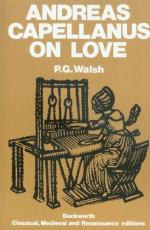|
This section contains 3,459 words (approx. 12 pages at 300 words per page) |

|
SOURCE: “Andreas Capellanus,” in Three Chapters on Courtly Love in Arthurian France and Germany, The University of North Carolina Press, 1956, pp. 18-25.
In the following excerpt, Weigand explains how, in De Amore, religious proscriptions against sex yield to the seductive ways of sensual love.
The Latin treatise,1 composed at the end of the 12th century, is the work of Andreas, a cleric, who refers to himself as the French royal chaplain. Inner evidence shows that he set himself the task of systematizing the conception of Courtly Love championed by Countess Marie of Champagne and her mother, Queen Eleanor. The treatise—some 200 pages in length—takes the form of a letter to his friend Walter, at whose importunings Andreas, putting on a show of reluctance, proceeds to instruct him in all matters concerning love. He goes about his task systematically, beginning with a definition of love and following it...
|
This section contains 3,459 words (approx. 12 pages at 300 words per page) |

|


